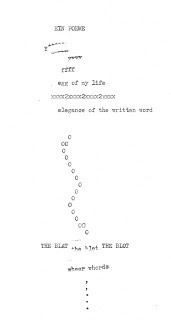Geof Huth's Blog, page 29
May 3, 2011
On the Last Day, There was Singing
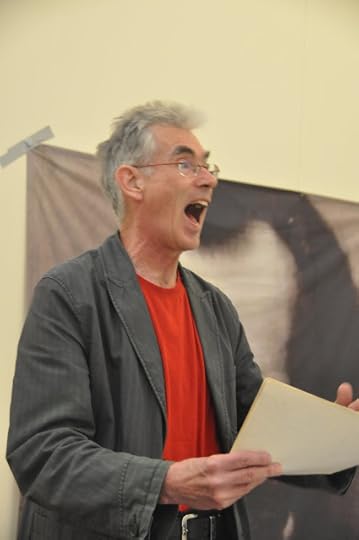 Jaap Blonk Performing Part of Kurt Schwitter's "Ursonate," Bury Art Gallery, Bury, England (1 May 2011)
Jaap Blonk Performing Part of Kurt Schwitter's "Ursonate," Bury Art Gallery, Bury, England (1 May 2011)The last day of the Text Festival was more of a day for poets and artists. We gathered in one of the open spaces in the gallery, and Ian Hunter led a group of sound poets and academicians in a discussion of "Ursonate," a sound poem by Kurt Schwitters that intrigues all of them. The discussion was informative and personal, each participant admitting to how "Ursonate" captured their imagination and what strange things that enchantment made them do. (Two of the panelists memorized the entire piece.) One of the joys of this part of the show was watching the incomparable Jaap Blonk perform part of "Ursonate" while showing us photocopies he'd made of the text of the sound poem in 1976.
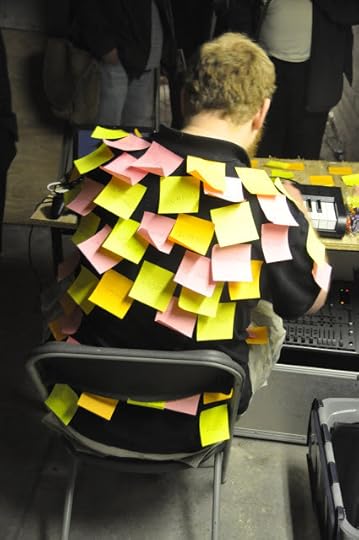 Andrew Faraday Performing His Sound Piece in the Basement of Warth Mill, Bury, England (1 May 2011)
Andrew Faraday Performing His Sound Piece in the Basement of Warth Mill, Bury, England (1 May 2011)After a break for lunch, we made our way to a distant outpost of Bury, to Warth Mill, which served as an internment camp for refugees from Nazi Germany during World War II, and which once housed Schwitters himself. We were in the basement of this facility, which was much like a cave, but filled with broken walls, breaches outward toward daylight, and all manner of dirty and broken equipment and supplies. It was a filthy and, thus, unforgettable space. In this spot, I found two broken bird's eggshells and wrote a poem on them, while we listened to Andrew Faraday play strange music through the space while he was covered with sticky notes.
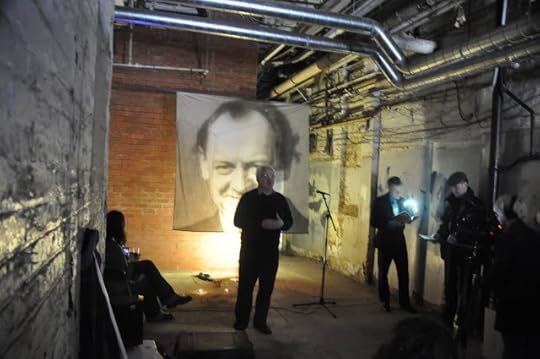 Ian Hunter Introduces "Ursonate" as Christian Bök Reads His Script by the Light of the Flashlight of My Cellphone (1 May 2011)
Ian Hunter Introduces "Ursonate" as Christian Bök Reads His Script by the Light of the Flashlight of My Cellphone (1 May 2011)Soon "Ursonate" was set to begin, so Ian Hunter introduced it. All the performers, except Jaap Blonk, needed to read from a copy of the script, so I lent them my cellphone with its flashlight app shining brightly.
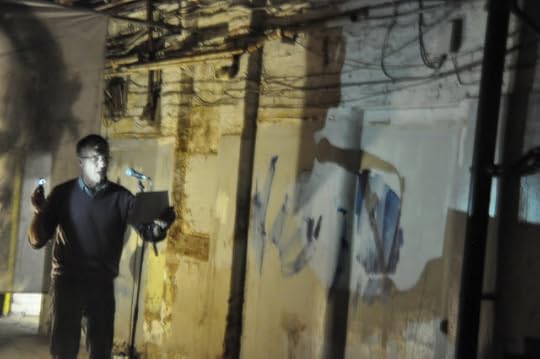 Christopher Fox Performs Part of "Ursonate" Quietly (1 May 2011)
Christopher Fox Performs Part of "Ursonate" Quietly (1 May 2011)The four performers had wildly different styles, which made the performance only more enjoyable. Christian Bök began with his hyper-controlled (he himself used the term "robotic") performance. The control and near perfection of this reading was remarkable (and very much like Christian), and it was much different than the looser but still controlled rendition that Florian Kaplick gave us. Most interesting to me was Christopher Fox's slow and melodious performance, which gave a totally different feel to the piece.
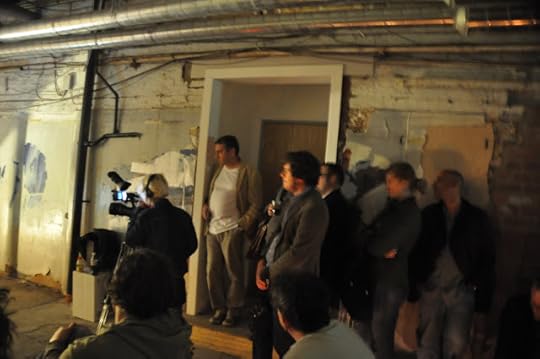 Audience Watching the Performance as the BBC Records the Performance (1 May 2011)
Audience Watching the Performance as the BBC Records the Performance (1 May 2011)Jaap Blonk finished the poem, performing from memory, and his performance was good, almost as good as Christian's right up until the end, at which point it became great. He used his mouth, his fingers in his mouth, the spit of his mouth, anything at hand (or mouth), to make this weird averbal sounds but following the script of the poem. He abandoned the poem and, thus, made it real, and his performance ended with the largest round of applause, justifiably so (and I say this having deeply enjoyed each of the performances).
After the end of the show, we left the cavelike room and out into the sun, which was too bright and warm, but we remained cool from the aftereffects of the performance, one of the finest performances I've ever seen and one seen by maybe 30 people in a dank and dirty basement in a small corner of Bury.
Still, a great way to end the Text Festival.
Published on May 03, 2011 20:59
May 2, 2011
Text Festival Gravestone Poem
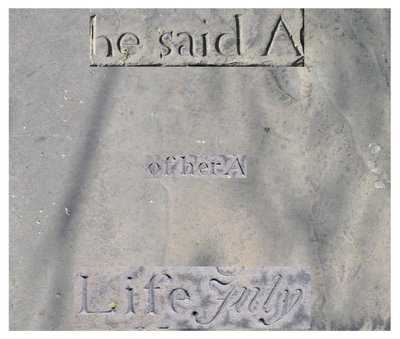
I'm back in Schenectady but still too busy to write up the last day of the Text Festival, so here is something small from the day before the last day. A poem based on extracts from the gravestones used to create pavement in front of the Bury Parish Church. This is definitely about the Festival and also definitely the most I can do tonight.
ecr. l'inf.
Published on May 02, 2011 19:43
May 1, 2011
Ending April at the Text Festival
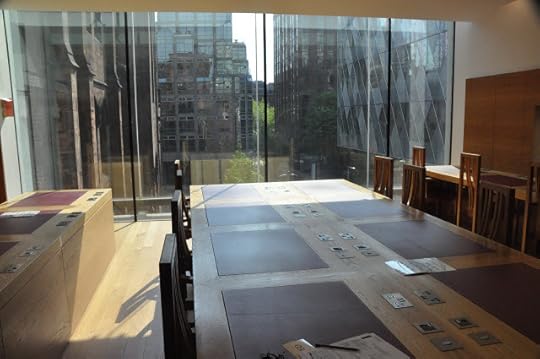
Researching the Papers of dom sylvester houédard at the John Rylands Library, Manchester
The entire country of Great Britain is fighting against me. Some royal couple decided to marry yesterday, so I could not go to the John Rylands Library's special collection to use the papers of dom sylvester houédard when I had some free time. Instead, the library opened at 10 am on Saturday, allowing me no way to review the creative works in houédard's papers before the Text Festival opened about a half an hour away in Bury.
I was very organized in this work. I was the first person admitted inside Rylands Library today and the first admitted to the special collections as well. After providing the required two forms of identification and letter of introduction, I began to work, explaining to the archivist that I had no time for study and would spend my time photographing worked by houédard. In about an hour, I took over 200 photographs, even though I was never allowed to have more than one folder at a time, even if the folder had but one piece of paper in it.
I was a little surprised to find almost no evidence of dom sylvester houédard's typewriter poetry, but now I have many examples of his reversals (now called ambigrams, which are texts where the letters are written in such a way that the texts can be read in different ways [say right side up and also upside down] and still have readable but different words in them). I can use this to study his tricks with reversals.
Festival Opening Featuring Exhibition Openings and Performances, Bury Art Gallery & Museum
Because of my stop at the special collections, Nancy and I arrived at noon and missed Marco Giovenale's performance, but we saw Helen White and Moniek Darge's sound poetry performances, and Marton Koppany's interesting reading not of his minimalist works but of his discussions with others of this work.
After that, we took a trip through the exhibit areas to see all the exhibits. The main exhibits, which included significant works by Liz Collini, Christian Bök, Tony Lopez, and Ron Silliman; the little Wonder Room exhibit of hundreds of visual poems, the tradestamps exhibit, and a beautiful little installation by Helen White. More on all of these soon.
Lunch
Nancy and I had a fine lunch with Tony and Sue Trehy.
Other Museums
After lunch, we visited two small exhibits: A Map of You Exhibition at The Transport Museum and a small exhibit at the Fusiliers Museum. Thoughts on this later too
Performances at the Bury Parish Church
We heard some great performances at the church from Phil Minton's Bury Feral Choir, Satu Kaikkonen & Karri Kokko, and Ron Silliman. More later.
Sound and Dark
The day ended with a number of other great performances at the Met Arts Centre, in Bury, by Christian Bök, Holly Pester, Eduard Escoffet, and derek beaulieu. I also performed an unannounced but long-planned performance just before the intermission.
Many more details need to be filled in, but this is a start at the documentation. I have hundreds of photos (most on Facebook already), plenty of video, and quite a bit of audio left to post. Documenting takes even more time than doing.
ecr. l'inf.
Published on May 01, 2011 19:19
April 30, 2011
Too Tired to Post
Hilton Deansgate, Room 920, Manchester, England, UK
Actually, it's not that I was too tired to post, just needed to get to sleep despite my ability to avoid sleep. Today, the Text Festival in Bury was busy (the most busy it will be), but that made sure I had the least time to write about it. Full writeup soon! And photos should be to Facebook soon, too.
Geof
Actually, it's not that I was too tired to post, just needed to get to sleep despite my ability to avoid sleep. Today, the Text Festival in Bury was busy (the most busy it will be), but that made sure I had the least time to write about it. Full writeup soon! And photos should be to Facebook soon, too.
Geof
Published on April 30, 2011 20:59
April 29, 2011
A Full Day and Life
Hilton Deansgate, Room 920, Manchester, England, UK
Today was too big a day for me to recount everything that happened in any detail at all. This will be just the roughest of notes on today's events, those of the day before the official opening of the Text Festival, a celebration of the text as art, in Bury, England. All of today's events, however, occur in nearby Manchester.
I started the day with a big breakfast, a huge British breakfast with lox and sausage and eggs and fruit and toast and tea. Then I took a cab to the Manchester offices of magazine The Big Issue on Swan Street, and my day began.
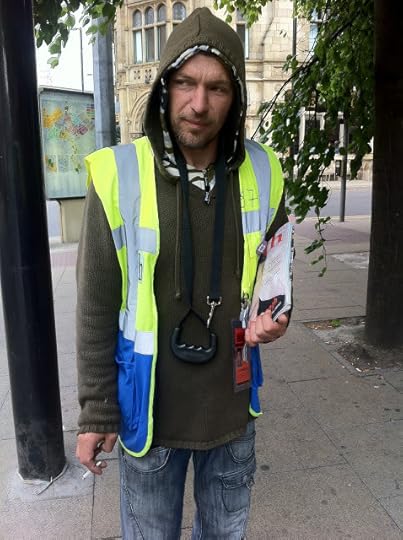 Tim Dixon, Street Vendor of The Big Issue (29 April 2011)
Tim Dixon, Street Vendor of The Big Issue (29 April 2011)
The start of the day was quite remarkable. I met up with the poet Phil Davenport, Gemma from The Big Issue, and Daniel from the local station of the BBC, and we visited four homeless men who make their living by buying copies of The Big Issue for £1 and selling each for £2, thus making a 100% profit. These men we met make their living that way, and exist in various states of homelessness, some having made it into flats they share with others.
When I started the day, I wondered if we were, somehow, taking advantage of these gentleman, by talking to them about their lives in order to learn about them and to find two or three phrases that actually map their lives, document them. This proved reasonably easy, because everyone makes poetic statements. It's just that we don't usually attune our ears to them, and Phil and I tried to do this today, and Phil especially succeeded. In the end, we had some beautiful statements from these four gentlemen, and I learned that we had given these men something. We'd given them the opportunity to tell their stories, and a way to document them. Ours was a human exchange of interest and attention. Even on a coldish morning in Manchester, the living human heart beats warm.
After this event, Phil and I walked back to my hotel where we had huge cups of cappuccino with Nancy. As we were drinking, Karri Kokko walked by on the street, I pounded on the windows until he saw me, and then he came in to see us. Karri, Nancy, and I had lunch together a little later, and stayed together until the party at Tony Trehy and Sue Collins' flat.
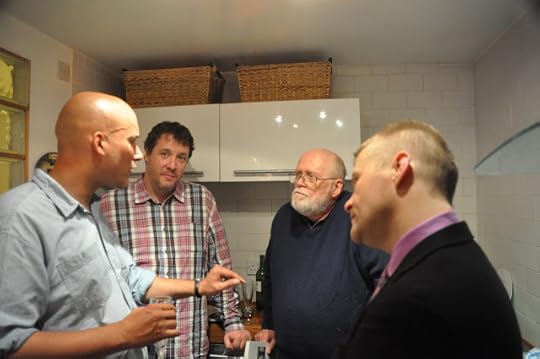 Alexander Jorgensen, Stephen Nelson, Ron Silliman, and Christian Bök, Manchester, England (29 April 2011)
Alexander Jorgensen, Stephen Nelson, Ron Silliman, and Christian Bök, Manchester, England (29 April 2011)
This party for the artists participating in the Text Festival was a huge event, one that allowed me to meet many people I'd never seen in the flesh before: Helen White, Marco Giovenale, and others, which added to those I'd met yesterday for the first time, Steve Giasson and my good friend Marton Koppany. (My Facebook wall is filled with photos from this even.)
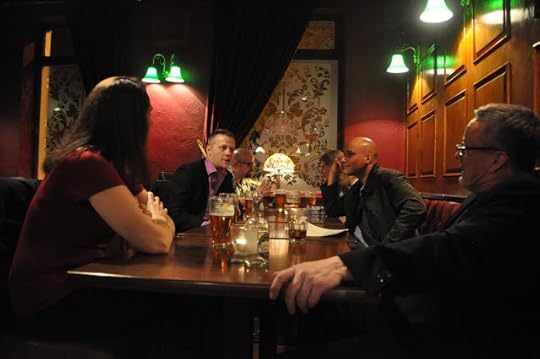 Nancy Huth, Christian Bök, derek beaulieu, Irena Jorgensen, Alexander Jorgensen, and Karri Kokko, The Ox, Manchester, England (29 April 2011)
Nancy Huth, Christian Bök, derek beaulieu, Irena Jorgensen, Alexander Jorgensen, and Karri Kokko, The Ox, Manchester, England (29 April 2011)
After the party, seven of us, most of us North Americans, walked a few blocks to the pub The Ox and talked for quite a while, during which time I recorded a few videopoemsongs, including this one of all the folks at the Ox with me:
It is good to spend time with my people. More tomorrow, after almost four hours of sleep.
ecr. l'inf.
Today was too big a day for me to recount everything that happened in any detail at all. This will be just the roughest of notes on today's events, those of the day before the official opening of the Text Festival, a celebration of the text as art, in Bury, England. All of today's events, however, occur in nearby Manchester.
I started the day with a big breakfast, a huge British breakfast with lox and sausage and eggs and fruit and toast and tea. Then I took a cab to the Manchester offices of magazine The Big Issue on Swan Street, and my day began.
 Tim Dixon, Street Vendor of The Big Issue (29 April 2011)
Tim Dixon, Street Vendor of The Big Issue (29 April 2011)The start of the day was quite remarkable. I met up with the poet Phil Davenport, Gemma from The Big Issue, and Daniel from the local station of the BBC, and we visited four homeless men who make their living by buying copies of The Big Issue for £1 and selling each for £2, thus making a 100% profit. These men we met make their living that way, and exist in various states of homelessness, some having made it into flats they share with others.
When I started the day, I wondered if we were, somehow, taking advantage of these gentleman, by talking to them about their lives in order to learn about them and to find two or three phrases that actually map their lives, document them. This proved reasonably easy, because everyone makes poetic statements. It's just that we don't usually attune our ears to them, and Phil and I tried to do this today, and Phil especially succeeded. In the end, we had some beautiful statements from these four gentlemen, and I learned that we had given these men something. We'd given them the opportunity to tell their stories, and a way to document them. Ours was a human exchange of interest and attention. Even on a coldish morning in Manchester, the living human heart beats warm.
After this event, Phil and I walked back to my hotel where we had huge cups of cappuccino with Nancy. As we were drinking, Karri Kokko walked by on the street, I pounded on the windows until he saw me, and then he came in to see us. Karri, Nancy, and I had lunch together a little later, and stayed together until the party at Tony Trehy and Sue Collins' flat.
 Alexander Jorgensen, Stephen Nelson, Ron Silliman, and Christian Bök, Manchester, England (29 April 2011)
Alexander Jorgensen, Stephen Nelson, Ron Silliman, and Christian Bök, Manchester, England (29 April 2011)This party for the artists participating in the Text Festival was a huge event, one that allowed me to meet many people I'd never seen in the flesh before: Helen White, Marco Giovenale, and others, which added to those I'd met yesterday for the first time, Steve Giasson and my good friend Marton Koppany. (My Facebook wall is filled with photos from this even.)
 Nancy Huth, Christian Bök, derek beaulieu, Irena Jorgensen, Alexander Jorgensen, and Karri Kokko, The Ox, Manchester, England (29 April 2011)
Nancy Huth, Christian Bök, derek beaulieu, Irena Jorgensen, Alexander Jorgensen, and Karri Kokko, The Ox, Manchester, England (29 April 2011)After the party, seven of us, most of us North Americans, walked a few blocks to the pub The Ox and talked for quite a while, during which time I recorded a few videopoemsongs, including this one of all the folks at the Ox with me:
Pub Song with Poets from Geof Huth on Vimeo.
On the evening of 29 April 2011 in the Ox in Manchester, England, Geof Huth sings a wordless poemsong in the bar area with his poet friends, Karri Kokko, derek beaulieu, Christian Bök, Alexander and Irena Jorgensen, and Nancy Huth.
It is good to spend time with my people. More tomorrow, after almost four hours of sleep.
ecr. l'inf.
Published on April 29, 2011 19:16
April 28, 2011
The Text Festival Almost Begins
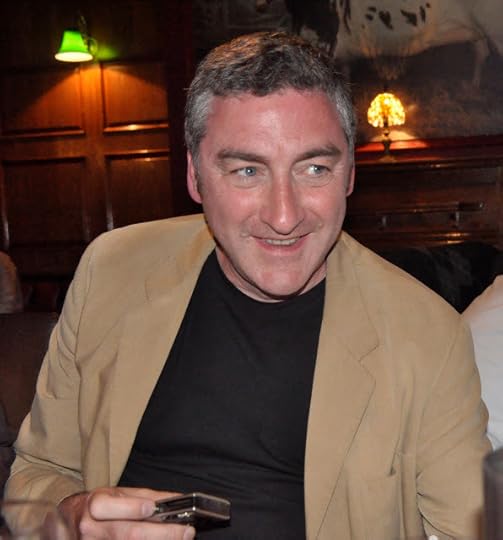 Tony Trehy at the Ox, Manchester, England (28 April 2011)
Tony Trehy at the Ox, Manchester, England (28 April 2011)The Text Festival hasn't quite started yet, but it is just about to. Tonight, a few of the poets and artists, about 15, who are already in town met at the Ox in Manchester to talk about poetry, the Text Festival, and anything else. We had a great meal, a few bottles of Chilean wine, and lots of fun.
In attendance were Tony Trehy himself (the mastermind of the Text Festival) and his wife Sue Collins, Christian Bök, derek beaulieu, Márton Koppány, Phil Davenport, Steve Giasson and his fiancé Marc, Alexander Jorgensen and Irena (whose last name I didn't get), a person who's name has totally slipped my mind, the great Liz Collini, Nancy Huth and her husband, me.
We are ready for the next few days of excitement. Christian has put together his molecular model relating to his Xenotext project, derek is working at installing a large dry-transfer (let's say, Letraset) poem to the window of the Fusiliers Museum, and Phil Davenport and I are ready to walk the streets of Manchester today with a band of BBC radio folks working with homeless people to create quickly written maps of their lives. It should be interesting, and I've no idea what will come of it, or what should.
So I feel perfectly prepared for it.
The temperatures here have been cold, but I have no jacket with me. I thought I'd pulled my leather jacket and stored it in my suitcase, but I'd pulled Nancy's, which is a little too small and feminine for me. I might be cold tomorrow walking the streets of Manchester for an hour or I might not, but I'll probably be okay. As I tell people, I can handle the cold, probably because I grew up primarily in the tropics.
ecr. l'inf.
Published on April 28, 2011 20:27
April 27, 2011
Typewrought
Geof Huth, "EIN POEME" (27 April 2011)
John F Kennedy International Airport, Terminal 8, Gate 4
Today, Phil Davenport, an almost twin of mine (bald men are considered identical) confirmed that he'd like me to send him a typewriter poem for an exhibition at the Transport Museum in Bury, England, this week, so, before I left this morning on a drive to JFK for a flight to England, I looked through my files and picked out three typewriter poems to send him, but before I scanned them I decided to create a typewriterly poem from scratch, went to the basement, kneeled in front of the ancient manual typewriter we still have, which rests on a tiny pupitre, and I typed out a little poem that I should have called "EINE POEME," but which I called "EIN POEME," a poem that was basically a standard syntactic textual poem but which included many typewriterly effects, enough so that its original typewritten form is necessary for the appreciation of it, assuming that is possible, and I scanned all four of these poems and emailed them to Phil in Manchester.
I am always making, always writing, I am a man of text and words, burdened by meaning and the meaninglessness of human codes, and I am flying to England in a couple of hours, not for the royal wedding of two people whose names I don't know and whose significance is nil in my world, but to attend the Text Festival, in its third incarnation in the small municipality of Bury, and I thank Tony Trehy for this opportunity and for the opportunities he creates for visual poets across the globe, because we are textual people, people of the word written and declaimed, people of the written character, whether it carries semantic meaning or not, and we relish this opportunity to be together to verify people like us exist.
ecr. l'inf.
Published on April 27, 2011 16:13
April 26, 2011
A Text Festival Itinerary for 2011 (with a Brief Glance at 2009)
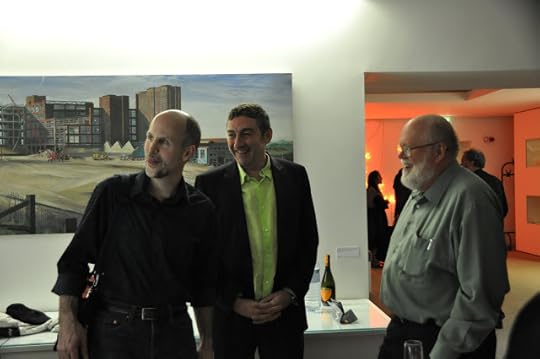 Geof Huth, Tony Trehy, and Ron Silliman after Huth's Reading, Text Festival (1 May 2009)
Geof Huth, Tony Trehy, and Ron Silliman after Huth's Reading, Text Festival (1 May 2009)Tomorrow, I leave for the Text Festival in Bury, England (and "Bury" is pronounced "bury," which seems right, but I've noticed that North Americans always guess it's pronounced "berry"). I have less of a role in this festival than 2009's but much more than in 2007's, and I have plenty to do while there. Here's what my schedule looks like at the moment:
27 April 2011
(Eastern Standard Time)
12:00 n Drive to John F. Kennedy Airport in New York City
8:45 pm Fly to Heathrow Airport, London
28 April 2011
(Greenwich Mean Time)
9:00 am Arrive at Heathrow
11:10 am Fly to Manchester
12:10 am Arrive in Manchester
1:00 pm Take Taxi to Manchester
1:30 pm Arrive at Hilton Manchester Deansgate
2:00 pm Sleep in room (if lucky enough to get into the hotel early)
Evening Dinner with Text Festival Artists in Manchester
29 April 2011
10 am I will be working with Phil Davenport and others walking around Manchester and making visual poetry postcards with homeless people (Someone will tell me if I've gotten this wrong)
Evening Party at Tony Trehy's Flat for Festival Artists
30 April 2011
9:00 am Researching Records of dom sylvester houédard at the John Rylands Library, Manchester
11:00 am Festival Opening Featuring Exhibition Openings and Performances, Bury Art Gallery & Museum
4:00 pm Ron Silliman, Satu Kaikkonen & Karri Kokko, and Phil Minton's Bury Feral Choir, Bury Parish Church
6:00 pm Buffet Dinner, the Met, Bury
7:30 pm Sound and Dark, Featuring Christian Bök, Holly Pester, Sarah Boothroyd, Eduard Escoffet, Bruno Bresani and Others, The Met Arts Centre, Bury
1 May 2011
11:00 MERZTEXTE, Bury Art Gallery & Museum (until 4 pm)
Evening Scavenging for Food in the Streets of Bury
2 May 2011
9:50 Fly out of Manchester Airport
Eastern Standard Time
12:40 Arrive at JFK Airport in New York
2:00 Drive Home
6:00 Arrive Home
6:01 Sleep (or write a poem)
Appearances of My Work at the Text Festival
Wonder Rooms, Bury Art Gallery (preview on April 30)
Exhibition will include the work of dozens of visual poets and 50 to 99 calligraphic visual poetry cards of mine. A total of 100 cards will become a part of the permanent collection of the Bury Art Gallery and Museum (the largest sale of my visual poetry by far ever; the next highest was probably about $300 when a visual poem of mine was accidentally sold when it should not have been and the cash went to another visual poet).
The History of Tradestamps, Bury Museum & Archives
Opening: 30 April 2011 at 11:30am
I submitted a modern "tradestamp" for this exhibit, though I am not positive it will be show. (I was paid for this piece, so I'm pleased regardless.)
Book Launched during the Festival
I'm not sure of the title of this book or what of mine will be in it, but during the festival a book will be launched featuring Ron Silliman, Robert Grenier, Tony Lopez, Phil Davenport, Carol Watts, Holly Pester, and me.
Blank Pages Issue 34
This Manchester magazine will feature an interview with me along with one of my poems from my 365 ltrs project.
I'm sure I'll keep busy. My main reason for going to the Text Festival is to see my friends, too many to mention and some whom I've never met before. It will be a great time.
I also had a great time at the last Text Festival. For views of 2009's festival, see these photographs:
30 April 2009
Views of Manchester along with photographs of the exhibits at the Text Festival exhibits and photos from the evening of videopoetry.
1 May 2009
Views of exhibits at the Text Festival, including plenty of my own work, and shots of my 20-minute (maybe longer) extravaganza of a reading. (It was long, but enjoyable, I believe.)
3 May 2009
More views of exhibits, especially of the work of Liz Collini, and shots of the artist's roundtable (maybe it was called a thought experiment) that we carried out in the morning. I got in trouble at this one, because I gave too much evidence that I didn't buy into this event--and I suggested the murder of Tony Trehy, but only for art's sake (and "It was a metaphor!").
ecr. l'inf.
Published on April 26, 2011 20:59
April 25, 2011
Working
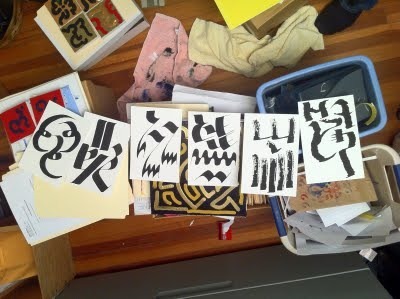
It's not necessary for things to be right side up for them to make sense. Sometimes the scene, the totality, is what matters, not the particulars.
To create certain visual poems, I move to the third floor, to my office, my studio, my library, complete with dictionary stand and over 1,000 dictionaries. To my personal floor and workspace that comes with a bathroom and a bed if I want it. But what I use most is the chaos of the place. As I work, I make more and more of a mess until I am wending my way through a maze of boxes, papers, books, and canvases (painted and not).
This is the opposite of my office at work, which is more than pristine. I have no filing cabinets, no shelves, just a few sheets of paper on my desk and a half-drawer of paper files within it. Everything else is electronic. I work in an office almost that is neat to the point of blankness. My walls are empty.
Last week when I was in Montana, a friend told me that I was strangely talented because I am both creative and logical, that it is as if I have two minds. A nice compliment, though I hardly believe, or if I'm of two minds I assume a battle is raging somewhere for hegemony over my mind. I do what I'm supposed to do when it's supposed to happen. Different points in time have different requirements.
Sometimes when I look at the mess I've made at home, at the inkstains on my fingers, I think that I am an artist. But I know I'm a scribbler. Visual poets tend to be outsider artists, though we might sometimes be real poets.
Tonight, I spent a couple of house putting ink to paper. Sheets of inkstained paper lie everywhere drying. The ink is palpable. Edible.
ecr. l'inf.
Published on April 25, 2011 20:59
April 24, 2011
What Comes in through Your Eye Leaves by Your Teeth
 derek beaulieu, "Prose of the Trans-Canada (2011)Yesterday, it arrived, and I've already removed it from my house for framing, but I've done yet another extravagant act in recognition of the value of poetry in a life, maybe only mine, but that's the one I have to work with.
derek beaulieu, "Prose of the Trans-Canada (2011)Yesterday, it arrived, and I've already removed it from my house for framing, but I've done yet another extravagant act in recognition of the value of poetry in a life, maybe only mine, but that's the one I have to work with.As soon as derek beaulieu's massive, and I might even say historic, Letraset poem, "Prose of the Trans-Canada," was released by BookThug, I ordered a copy, even though the cost was steep. Printed on matte polypro film, which has a strong and distinct odor especially when your nose is close to the poem so you can see its rich detail, the poem is a remarkable 16" by 52" in size. It came to my house rolled in a tube, and within an hour I was off to the frame shop to have it framed (where the cost of framing was just a bit over twice the cost of the print, keeping in mind that the Canadian dollar is now stronger than the American).
While choosing a frame for the piece, I noted that I wouldn't be framing it to hand vertically, even though the title at the "bottom" of the piece clearly says this orientation. Instead, I'll be hanging it horizontally, so that it will be in one of the orientations derek had it while he was working on it on his coffee table. This is an important consideration for me, but I think I made the right decision. In one sense, though top and bottom, left and right, are unnecessary in this piece in which letters swirl around each other.
This poem has been placed by derek in a bit of conceptual context, so I'll present BookThug's explanation here:
In 1913 Blaise Cendrars created his monumental Prose of the Trans-Siberian, a milestone in the history of artists books and visual poetry. When the intended edition of 150 copies was laid end-to-end they measured the same length as the height of the symbol of Parisian Modernity, the Eiffel Tower.
derek beaulieu's prodigious Prose of the Trans-Canada responds to Cendrars' legacy in a 16" x 52" visual poem. When all 150 copies of this limited edition are placed end-to-end, the resultant length is the same as the symbol of Calgarian Modernity, the Calgary Tower.
"Prose of the Trans-Siberian" is another interesting long poem, though presented as an orihon rather than a single unfolded range, one that is colorful, engaging, and full of words. I think this reference back to Cendrars' work is apt, since derek is also working in the long-form visual poem, and he is modernizing it, in a way, by making a poem that is primarily wordless and about the interlocking of letters, and he is making a poem in Calgary, not Paris. I also like the repeated game of making the poem in the same edition of 150 copies as its ancient ancestor. But this isn't really significant to the piece conceptually. What matters is what's before your eyes, and what there is is detail after detail. This poem of derek's is a poem of surging, most of the movement in is is arcing, and fragmented. It is a post-modern futurist poem, having let go of the screaming tongue so as to allow the letters to speaking, silently, for themselves.
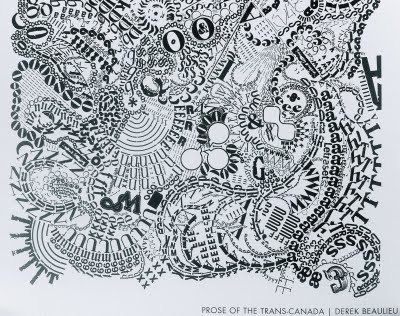
Starting at the base of the poem, you can see the cogs and gears of the poem, how it comes together to suggest movement, the belly of a machine, water swirling in a small concavity at the edge of a stream and then moving on, because all there is is movement. The insistent repetitions of the same letters gives the poem body and shape, gives it depth, turns it into an aerial view of the world, the world of language, but so high up you can perceive the shapes but cannot make out the words, the sense, the meaning that might be made from something smaller and more exact than broad brushstrokes. This is the natural world of language: not quite meaningful but leaning hard into the side of meaning.
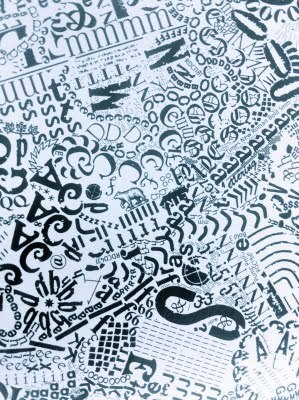
In spots, there is chaos: the breaking apart of the curves, a tendency towards irregularity, shapes of letters or punctuation or simple bars pushing thorough streams of other letters. Typefaces proliferate. The plastic lettering of the Letraset type shows its age, cracking and flaking over. And at the edge of the poem, you can find scattered flakes of Letraset that would just not sit in place. Also, you find the occasional real surprise in this mass of thousands and thousands of characters, such as the bear passant above, a little bit of heraldry that might remind us of Canada itself.
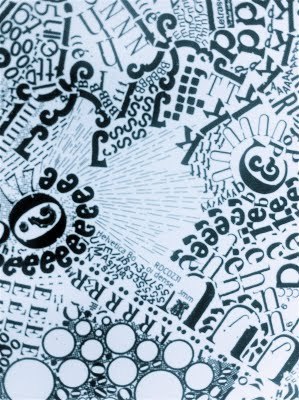
Drama comes in this poem, which cannot be read in any direct way but which must be investigated with one's nose against it (so that even the huge copy of it presented above is too small to afford a good enough view of the piece). Circles are the culmination of a curve, so they predominate in the poem, as above, where huge empty circles congregate with Os to open the space and change the texture, making it both open with circles and dense with Os. And these circles are repeated in the giant O and C elsewhere in the beaulieu. But in the dense hegemony of these Os, delicate lines radiate out from one central O, taking the form of rays and the O taking the place of the sun, thus once again bringing the natural world into our field of vision. Without words to guide us, we use the shapes that masses of letters make to find meaningful patterns, and this poem struggles between nature and the machine.
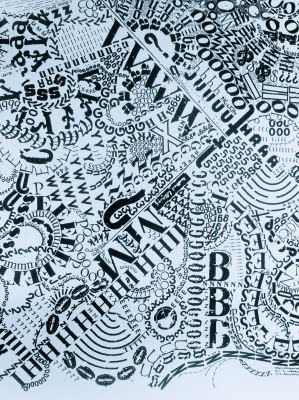
At times, what restricts the manic arcing of this work are straight lines of text, which do not bring other to the text, but which hold it in abeyance for a while, for a matter of inches. These straight lines are like roads through a forest. They add some definition and stop some growing, but they cannot hold it all back or in place.
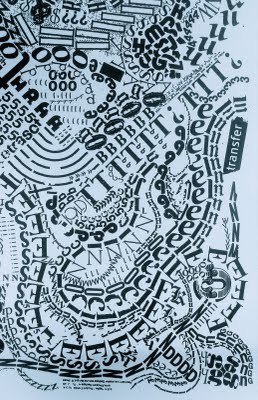
What I like about this poem is how it does things I would never do, such as rub onto the page the Letraset metadata (the company name, the explanation of its uses, its copyright notices). This does two things for me: 1. It complicates the universe we are seeing, making it one that does include words, but only those derek is faced with. He cannot make words out of the letters himself, though it is possible to perceive words in this maelstrom. 2. It puts the piece in context. It has the piece explain to us where it comes from, how it was made, so that we can figure out the piece from the evidence it carries always within itself.
This is a truly great piece of work, one to be admired in person, so that you can stand back and see the entire surface of its own earth, and one you must look at so closely that you almost enter the forests of this world never to return home again.
______
beaulieu, derek. Prose of the Trans-Canada. BookThug: Toronto, 2011. Can$95.
ecr. l'inf.
Published on April 24, 2011 20:34

